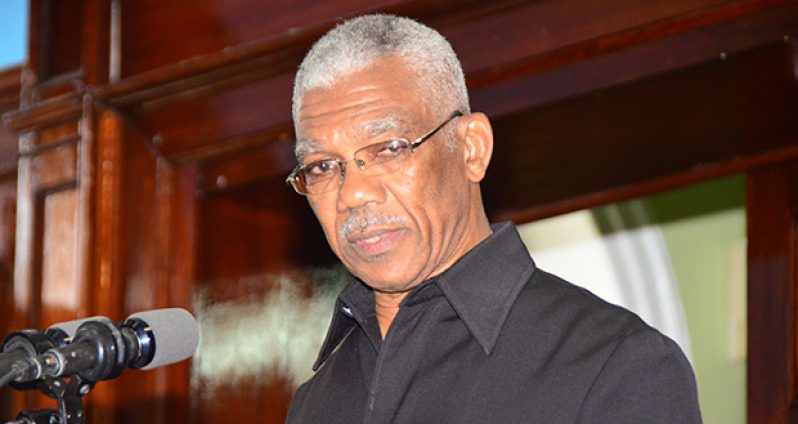IN dismissing contentions that Guyana will experience a financial crisis due to the slow down of the economy, President David Granger said he is confident the country will achieve its 3.4% growth projection.At the time, he was responding to a question posed by the Guyana Chronicle during the televised Public Interest programme at the Ministry of the Presidency.
Guyana’s economy has dropped by 2.5% during the first half of the year, when compared to the same period in 2014, signalling a growth rate of just 0.9%. The Leader of the Opposition had expressed fear that the decline in the economy is an indication of the financial crisis that may face the country long before it experiences an economic crisis.
But yesterday President Granger wasted no time in dismissing this concern by the Opposition Leader. In alluding to the “unnecessary strike” that caused Guyana’s sugar industry to grind to a halt earlier this week, President Granger said Mr Bharrat Jagdeo should use his influence over unions which are known to be affiliated to his party to ensure that there is greater industrial stability.
He stressed that Guyanese should be encouraged to contribute to the development of the country and by extension its economy.
“I do not believe that there are grounds for instability. He came into the presidency having been Minister of Finance, so he is quite aware of the problems, the fiscal problems that face us – for example, I have a clear recollection during the 2000s, he said while he was president, that we were losing over $7B a year from evasion of taxes on fuel alone,” President Granger noted.
Using the “knowledge” he has, the President opined that the Opposition Leader should not only convince the unions, but his supporters as well, to endorse a lawful economy which is going to be the basis of Guyana’s transformation.
In reference to the growth of the economy, the President said “I am confident that we are going to reach this projection (of 3.4%).” It was explained that the projection is based on recovery of excise taxes from basic commodities such as rice, sugar, bauxite and gold.
Efficient tax collection
“At the same time, we need to look at other measures in the government, for example, fiscal measures,” he added, noting that the government must improve the efficiency of the collection of taxes, while simultaneously reducing tax evasion, smuggling and other forms of contraband.
President Granger said his government must ensure that revenues collected are paid into the treasury. It was pointed out that “in the past some of the revenues were diverted to other agencies such as NICIL,” an entity which went about the business of building hotels and other projects.
Nevertheless, he is optimistic that once the structural programmes are initiated by the government, in years to come Guyana’s economy will grow by 5-8%.
Asked whether his government would consider using aspects of the late President Desmond Hoyte’s 1989 Economic Recovery Programme, given the fact that the country’s Gross Domestic Product (GDP) increased by 6% in 1991, President Granger said there is no need to go backward.
It was explained that the economic recovery programme at the time dealt with short and medium-term measures which were needed to reverse flaws within the financial system in the 1980s, which evolved mainly because a large part of the economy was state-owned.
“So the Economic Recovery Programme was a programme designed to re-balance the economy by giving greater emphasis or a more important role to the private sector,” the President further explained.
He said while Hoyte’s recovery programme was necessary at the time, it was not sufficient for the restructuring of the economy, pointing out that it catered mainly for the “six sisters” – sugar, rice, bauxite, gold, diamond and timber.
“Essentially, Guyana’s economy is still based on agriculture, mining and forestry and this limits our ability to grow,” President Granger said as he underscored the importance of diversifying the economy to a larger extent.
“There is no point going back to the Hoyte’s reform,” he emphasised, noting that while the principles that were enshrined in the economic recovery programme are still valid, the country must liberalise its economy.
“We are not going to move backwards, we are not going to start re-establishing state corporations; we would like to see a greater role for the private sector, but at the same time the State has the responsibility to provide the infrastructure which the private sector will not provide in order to allow those industries to function.”
Guyana, he added, must work to restructure its economy in a fundamental and strategic way in order to experience real transformation.
By Svetlana Marshall




.png)









